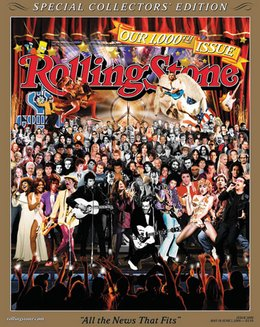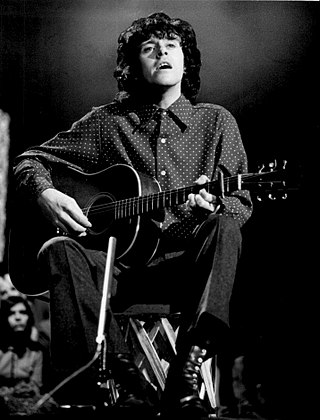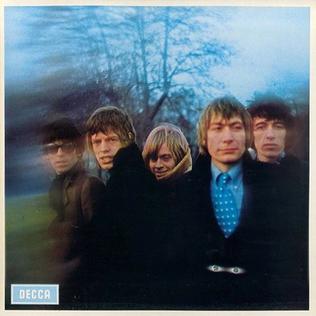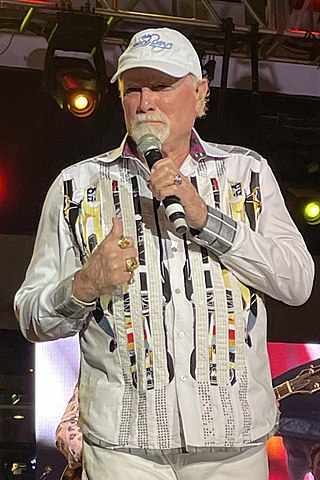
Rolling Stone is an American monthly magazine that focuses on music, politics, and popular culture. It was founded in San Francisco, California in 1967 by Jann Wenner and the music critic Ralph J. Gleason.

Lewis Brian Hopkin Jones was an English musician and founder of the Rolling Stones. Initially a slide guitarist, he went on to sing backing vocals and played a wide variety of instruments on Rolling Stones recordings and in concerts.

Donovan Phillips Leitch, known mononymously as Donovan, is a Scottish musician, songwriter and record producer. He emerged from the British folk scene in early 1965, and subsequently scored multiple international hit singles and albums during the late 1960s. His work became emblematic of the flower power era with its blend of folk, pop, psychedelica, and jazz stylings.

Keith Richards is an English musician, songwriter, singer and record producer who is an original member, guitarist, secondary vocalist, and co-principal songwriter of the Rolling Stones. His songwriting partnership with the band's lead vocalist Mick Jagger is one of the most successful in history. His career spans over six decades, and his guitar playing style has been a trademark of the Rolling Stones throughout the band's career. Richards gained press notoriety for his romantic involvements and illicit drug use, and he was often portrayed as a countercultural figure. First professionally known as Keith Richard, by the early 1970s he had fully asserted his family name.

William George Wyman is an English musician who was the bass guitarist with the rock band the Rolling Stones from 1962 to 1993. Wyman was part of the band's first stable lineup and performed on their first 19 albums. Since 1997, he has performed as the vocalist and bass guitarist for Bill Wyman's Rhythm Kings. He was inducted to the Rock and Roll Hall of Fame as a member of the Rolling Stones in 1989. Wyman briefly returned to recording with the Rolling Stones in 2023.

Lillian Roxon was an Australian music journalist and author, best known for Lillian Roxon's Rock Encyclopedia (1969).

Friends is the fourteenth studio album by the American rock band the Beach Boys, released on June 24, 1968, through Capitol Records. The album is characterized by its calm and peaceful atmosphere, which contrasted the prevailing music trends of the time, and by its brevity, with five of its 12 tracks running less than two minutes long. It initially sold poorly, peaking at number 126 on the Billboard charts, the group's lowest U.S. chart performance to date, although it reached number 13 in the UK. Since its release, fans have generally come to regard the album as one of the band's finest.

Their Satanic Majesties Request is the sixth studio album by the English rock band the Rolling Stones, released in December 1967 by Decca Records in the UK and by London Records in the United States. It was the first Rolling Stones album released in identical versions in both countries. The title is a play on the "Her Britannic Majesty requests and requires" text that appeared inside a British passport.

Creem is an American rock music magazine and entertainment company, founded in Detroit, whose initial print run lasted from 1969 to 1989. It was first published in March 1969 by Barry Kramer and founding editor Tony Reay. Influential critic Lester Bangs served as the magazine's editor from 1971 to 1976. It suspended production in 1989 but attained a short-lived renaissance in the early 1990s as a tabloid. In June 2022, Creem was relaunched as a digital archive, website, weekly newsletter, and quarterly print edition.

Between the Buttons is the fifth British and seventh American studio album by the English rock band the Rolling Stones, released on 20 January 1967 in the UK and 10 February in the US. Reflecting the band's brief foray into psychedelia and baroque pop balladry during the era, the album is among their most eclectic works; multi-instrumentalist Brian Jones frequently abandoned his guitar during the sessions in favour of instruments such as organ, marimba, dulcimer, vibraphone, kazoo, and theremin. Keyboard contributions came from two session players: former Rolling Stones member Ian Stewart and frequent contributor Jack Nitzsche. Between the Buttons would be the last album produced by Andrew Loog Oldham, who had, to this point, acted as the band's manager and produced all of their albums.

Aftermath is the fourth studio album by the English rock band the Rolling Stones. The group recorded the album at RCA Studios in California in December 1965 and March 1966, during breaks between their international tours. It was released in the United Kingdom on 15 April 1966 by Decca Records and in the United States in late June by London Records. It is the band's fourth British and sixth American studio album, and closely follows a series of international hit singles that helped bring the Stones newfound wealth and fame rivalling that of their contemporaries the Beatles.
Crawdaddy was an American rock music magazine launched in 1966. It was created by Paul Williams, a Swarthmore College student at the time, in response to the increasing sophistication and cultural influence of popular music. The magazine was named after the Crawdaddy Club in London and published during its early years as Crawdaddy!.
Go-Set was the first Australian pop music newspaper, published weekly from 2 February 1966 to 24 August 1974, and was founded in Melbourne by Phillip Frazer, Peter Raphael and Tony Schauble. Widely described as a pop music "bible", it became an influential publication, introduced the first national pop record charts and featured many notable contributors including fashion designer Prue Acton, journalist Lily Brett, rock writer / band manager Vince Lovegrove, music commentator Ian "Molly" Meldrum, rock writer / music historian Ed Nimmervoll and radio DJ Stan Rofe. It spawned the original Australian edition of Rolling Stone magazine in late 1972.

Michael Edward Love is an American singer and songwriter who is the lead vocalist of the Beach Boys which he co-founded with his cousins Brian, Dennis, and Carl Wilson and their friend Al Jardine. Characterized by his nasal tenor and occasional bass-baritone singing, Love has been one of the band's vocalists and lyricists for their entire career, contributing to each of their studio albums and serving as their frontman for live performances. During the mid-1960s, he was one of Brian's main collaborators, contributing lyrics to hit records such as "Fun, Fun, Fun" (1964), "I Get Around" (1964), "Help Me, Rhonda" (1965), "California Girls" (1965), and "Good Vibrations" (1966).

"We Love You" is a song by the English rock band the Rolling Stones that was written by Mick Jagger and Keith Richards. Their first new release of the summer of 1967, it was first released as a single on 18 August in the United Kingdom, with "Dandelion" as the B-side. The song peaked at number eight in Britain and number 50 in the United States, where "Dandelion" was promoted as the A-side and peaked at number 14.

Jeffrey Morgan is a Canadian writer and photographer who is best known for being the authorized biographer of both Alice Cooper and Iggy Pop and The Stooges.
Sir Michael Edward Lindsay-Hogg, 5th Baronet, is a British American television, film, music video, and theatre director. Beginning his career in British television, Lindsay-Hogg became a pioneer in music film production, directing promotional films for the Beatles and the Rolling Stones. Following his work with these bands, he branched out into film and theatre, while still maintaining successful careers in television and music video production.

Barry Feinstein was an American photographer and filmmaker, known for his photographs of 1950s Hollywood, the 1960s music scene, and his close personal and professional relationships with celebrities like Bob Dylan and Steve McQueen. Feinstein produced over 500 album covers, featuring his photographs and graphic designs.
In late August 1967, the English rock band the Beatles attended a seminar on Transcendental Meditation (TM) held by TM creator Maharishi Mahesh Yogi at Bangor Normal College in Bangor, Wales. The visit attracted international publicity for Transcendental Meditation and presented the 1960s youth movement with an alternative to psychedelic drugs as a means to attaining higher consciousness. The Beatles' endorsement of the technique followed the band's incorporation of Indian musical and philosophical influences in their work, and was initiated by George Harrison's disillusionment with his visit to San Francisco's Haight-Ashbury district in early August.

In February 1967, two members of the Rolling Stones, the lead singer Mick Jagger and the guitarist Keith Richards, were arrested at Richards' home, Redlands, West Wittering, Sussex for drug possession. The raid had been preceded by a major campaign by the tabloid newspaper the News of the World, which Jagger was suing for libel at the time, and which carried lurid stories regarding Jagger and his girlfriend, Marianne Faithfull. Although convicted—and having spent a night in prison—a publicity campaign by their colleagues in the music industry encouraged popular support and criticism of the decision to prosecute them. Most notably, the traditionally conservative newspaper The Times published an op-ed by William Rees-Mogg asking Who Breaks a Butterfly on a Wheel?, in which he criticised the prosecutions as unfounded and unnecessary.
















